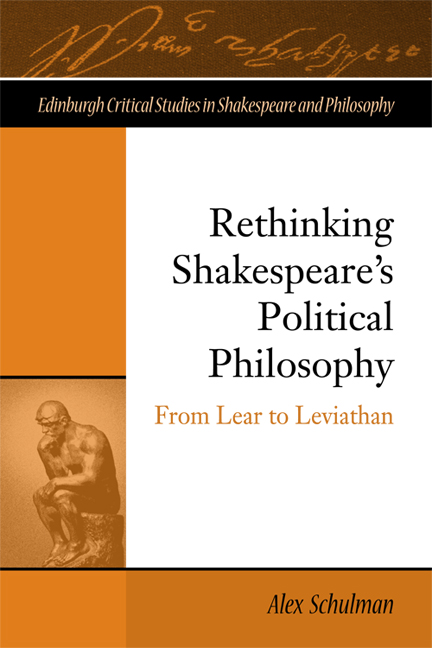Book contents
- Frontmatter
- Contents
- Acknowledgements
- Abbreviations
- Series Editor's Preface
- Introduction
- I SHAKESPEAREAN ANTIQUITY
- II SHAKESPEAREAN MODERNITY
- 3 King Lear and the State of Nature
- 4 Shakespeare's Novus Ordo Seclorum: Freedom and Authority in the English Histories
- 5 Shakespeare and the Theological'Political Problem
- Epilogue: Brave New Worlds
- Notes
- Index
3 - King Lear and the State of Nature
from II - SHAKESPEAREAN MODERNITY
Published online by Cambridge University Press: 05 August 2016
- Frontmatter
- Contents
- Acknowledgements
- Abbreviations
- Series Editor's Preface
- Introduction
- I SHAKESPEAREAN ANTIQUITY
- II SHAKESPEAREAN MODERNITY
- 3 King Lear and the State of Nature
- 4 Shakespeare's Novus Ordo Seclorum: Freedom and Authority in the English Histories
- 5 Shakespeare and the Theological'Political Problem
- Epilogue: Brave New Worlds
- Notes
- Index
Summary
But what father in the flesh desires his children always to be infants so that he may have more control over them for his own pleasure?
Erasmus to Paul Volz (1518)Had the patriarchs their power given them by their own children? … If, then, fatherhood enjoyed this authority for so many ages by the law of nature, when was it lost, or when forfeited, or how is it devolved to the liberty of the multitude?
Sir Robert Filmer, PatriarchaThis chapter, which focuses on King Lear, begins the conversation between Shakespeare and modern political theory that makes up the rest of the book. In the Introduction I cited Sheldon Wolin's Politics and Vision, which interpreted modern political theory as a web of attempts to adapt politics to two consecutive eruptions existing structures could not contain: first, Reformation religious passions; second, social upheavals caused by the dawning of capitalism. The minimal precondition for agile response to such crises was a state unshackled from medieval societies’ traditional ‘two swords, three estates’ ideology. In practice, of course, Western nation states modernised over hundreds of years, and in markedly different ways depending on local circumstances. Here I focus, theoretically, on one of the process’ major legitimating concepts: the ‘social contract’ authorised by escape from a ‘state of nature’.
A ‘two swords, three estates’ conception prizing, at least officially, religious uniformity and social stasis, is ill-equipped to deal with modernisation pressures rendering creedal pluralism and commercial-technological growth increasingly non-refusable. The social contract idea claims credibility through better accommodating those facts. If government's main purpose is not to perfect us but protect us from each other's worst depredations – lawless violence – then different confessions should ideally have no more difficulty coexisting than people of different eye colour. (The difficult question, taken up in Chapter 5, is how much religions themselves must change to facilitate this project.) And a political order whose foundational purpose is to protect individuals from anarchic violence moves naturally, once this is accomplished, to foregrounding the goods such protection enables and/or relies upon: property accumulation, technological innovation, trade.
- Type
- Chapter
- Information
- Rethinking Shakespeare's Political PhilosophyFrom Lear to Leviathan, pp. 97 - 124Publisher: Edinburgh University PressPrint publication year: 2014



